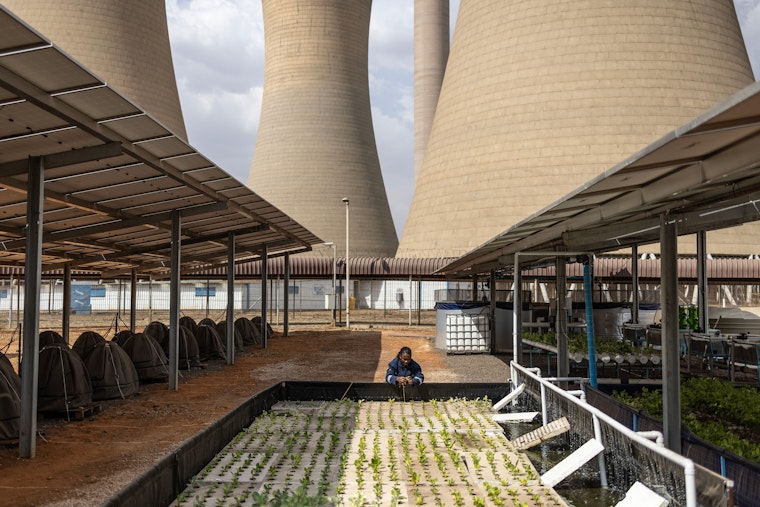Forging New Paths to Green Development for the Global South
By Laura Carvalho

Climate disasters are becoming ever more frequent, costly, and deadly for the world, but reactionary political movements are hindering progress to act. The year 2024 was the hottest on record, with storms, heatwaves, and floods claiming lives, devastating habitats, and shattering livelihoods. Meanwhile, economic precarity fuels unrest and authoritarianism that divides societies and risks geopolitical security. This tumultuous era lends itself toward catastrophizing but, far from an economic burden, the green transition can be a vital catalyst for countries to become more equal and prosperous.
Industrial policy—government-led tools like subsidies or tariffs that shape the economy by supporting specific firms and sectors—was for decades shunned by a neoliberal model that favored free markets. But just as the COVID-19 pandemic saw massive state intervention in key economic sectors to combat a public health emergency, now the world’s leading economies plough billions into their own industries to confront the climate crisis. The era of green industrial policy is upon us. But countries in the Global South are being held back from pursuing similar sustainable economic development goals, and the fruits of the just transition are not equally shared.

While China and high-income countries dominate over two thirds of all green industrial policies toward solar, wind, batteries, and electric vehicles, low-income countries are far behind. Developing countries provide labor and commodities (e.g., cobalt from Democratic Republic of Congo, nickel from Indonesia, lithium from Chile) to be turned into high-value products in a handful of higher-income countries which sell them back to the Global South but retain the profits. This value-chain colonialism aggravates inequality already entrenched by decades of neoliberal policy imposed on much of the world.
Our economic and climate prosperity work focuses on redressing this imbalance and supporting countries to build a more progressive framework. Low carbon development can boost innovation, open new markets, and drive competitiveness and resilience but, rather than just leaving this to market forces, we believe that strong states can achieve their climate objectives and even stimulate regional cooperation. To advance these aims, the Open Society Foundations are committing $400 million to cultivate new economic models that deliver climate goals, sustainable jobs, and social justice across the Americas, Africa, the Middle East and North Africa, and Southeast Asia.
Our goals include:
- Secure commitments from policymakers to implement green industrial strategies that create jobs and reduce inequalities
- Strengthen coalition-building across business, labor, climate advocates, youth movements, Indigenous and rural communities, and facilitate their engagement with governments and institutions
- Support think tanks promoting progressive economic frameworks that address climate transition within development agendas
- Ensure governments in the Global South have access to affordable, flexible, and sustainable sources of finance
- Address the asymmetry and double standards in the international trade system to facilitate better market access for the Global South while encouraging South-South trade agreements
“Through well-crafted green transition pathways, we aim to reduce insecurity and inequality within and between countries.”
My native Brazil is using momentum from its global leadership roles—the G20 last year and BRICS and COP30 this year—to accelerate green industrial policies. In the southeastern state of Espirito Santo we are working closely with the development bank, BANDES, to convert oil royalties into driving green economic transformation. We are also providing ongoing support to the Brazilian Landless Workers’ Movement—one of the region’s leading agrarian rights group—helping them adopt a platform for small farmers that includes technical training, access to biofertilizers, and agricultural machinery.
- In Mexico we assisted the Ministry of Environment in the creation of the Circular Economy Development Hub in Hidalgo, featuring environmental restoration programs, facilities to transform organic waste into fuel and valuable resources, and economic opportunities for local communities.
- In South Africa we are backing the Global Energy Alliance for People and Planet to develop prototypes of inclusive supply chains, focusing on Black-owned and community-based enterprises. At the pan-African level we are supporting diverse actors like the Africa Green Industrialisation Initiative, a pioneer in coordinating industrial strategy across several countries which builds sectoral clusters focused on mineral processing, battery manufacturing, green fuels, and eco-industrial parks.
- In Indonesia we are working with local partners to support the Ministry of Trade in developing a road map that enhances the country’s ability to supply the world with essential equipment and technology needed for global decarbonization efforts, while ensuring a self-funded green transition that reduces poverty and provides opportunities for the young workforce.
The economic and climate prosperity work focuses and deepens the Open Society Foundations’ previous work at the intersection of climate and economic justice. Through well-crafted green transition pathways, we aim to reduce insecurity and inequality within and between countries, and by forging alternative models to neoliberalism our work will counter the authoritarian populism that thrives on economic grievance. With countries of the Global South leading this shift, we can encourage a more balanced form of multilateralism.

Laura Carvalho is a director of Programs at the Open Society Foundations.


